Lawsuit: WVa abortion ban irrational, unconstitutional
A health provider has filed a lawsuit seeking to overturn West Virginia’s near-total abortion ban

Your support helps us to tell the story
From reproductive rights to climate change to Big Tech, The Independent is on the ground when the story is developing. Whether it's investigating the financials of Elon Musk's pro-Trump PAC or producing our latest documentary, 'The A Word', which shines a light on the American women fighting for reproductive rights, we know how important it is to parse out the facts from the messaging.
At such a critical moment in US history, we need reporters on the ground. Your donation allows us to keep sending journalists to speak to both sides of the story.
The Independent is trusted by Americans across the entire political spectrum. And unlike many other quality news outlets, we choose not to lock Americans out of our reporting and analysis with paywalls. We believe quality journalism should be available to everyone, paid for by those who can afford it.
Your support makes all the difference.An abortion provider filed a lawsuit Wednesday seeking to overturn West Virginia's near-total ban, saying it is unconstitutional, irrational and causes irreparable harm to the state's only abortion clinic and its patients.
The lawsuit asks for a halt to the four-month-old abortion ban while the case is heard in federal court. Republican Gov. Jim Justice on Sept. 16 signed a bill passed earlier that week making West Virginia the second state to enact a law prohibiting the procedure since the U.S. Supreme Court's June ruling overturning its constitutional protection.
The law requires abortions to be performed by a physician at a hospital — a provision that at least two Republican lawmakers have said was intended to shut down abortions at the Women’s Health Center of West Virginia. It has provided the procedure since 1976 and was the state’s sole abortion clinic.
Under the law, providers who perform illegal abortions can face up to 10 years in prison.
According to the lawsuit, the law “severely restricts the circumstances in which abortion can be provided and imposes new, irrational requirements on how abortion care can be provided.”
The lawsuit was filed on behalf of the Women's Health Center by the American Civil Liberties Union and its West Virginia chapter, Mountain State Justice, and the Cooley law firm. It said the law's care restrictions "are out of touch with modern medicine, lack any rational justification, and are not logically connected to any legitimate government interest and are therefore unconstitutional" under the 14th Amendment's due process and equal protection rights.
The Charleston clinic suspended abortions shortly after lawmakers passed the bill and provided West Virginia women with resources to book appointments out-of-state and funding to help cover travel and the procedure, clinic Executive Director Katie Quiñonez said.
According to the lawsuit, the law's care restrictions are “continuing to inflict irreparable harm not only on Plaintiffs’ mission, purpose, and ability to practice their profession and their constitutional rights, but also on the health and wellbeing of their patients and West Virginians seeking access to this essential care.”
The lawsuit names West Virginia Board of Medicine President Ashish P. Sheth and board Secretary Matthew Christiansen as defendants. An after-hours message left Wednesday evening with the board seeking comment on the lawsuit was not immediately returned.
The state's abortion ban has exemptions for medical emergencies and for rape and incest victims until eight weeks of pregnancy for adults and 14 weeks for those under the age of 18. Victims must report their assault to law enforcement 48 hours before the procedure. Minors can report to the police or a doctor, who then must tell police.
When he signed the legislation, Justice described it as “a bill that protects life.”
Quiñonez said the law “pushes essential abortion care out of reach.”
“With each day this ban remains in effect, we are forced to turn patients away because politicians took away their power to make the best medical decisions for themselves during pregnancy," she said in a statement. "Whether it’s in the statehouse or courthouse, we will never stop fighting to ensure our patients can access essential care they need.”
More than a dozen states now have abortion bans, though most were approved before the Supreme Court ruling and took effect once the court threw out the constitutional right to end a pregnancy.